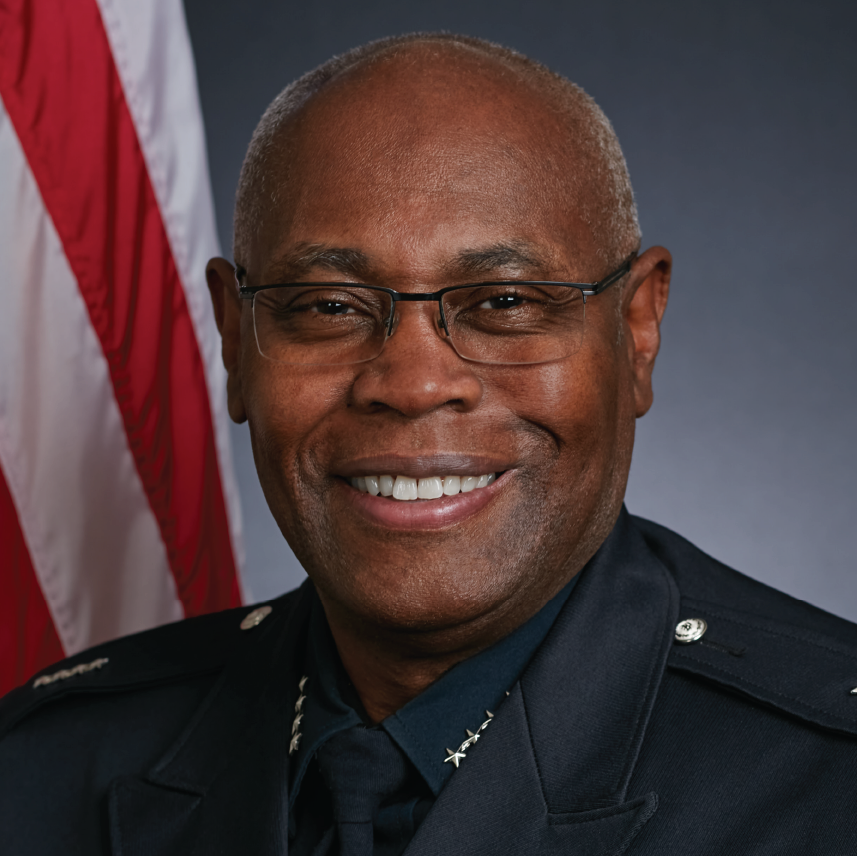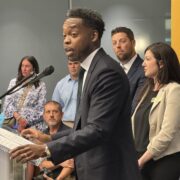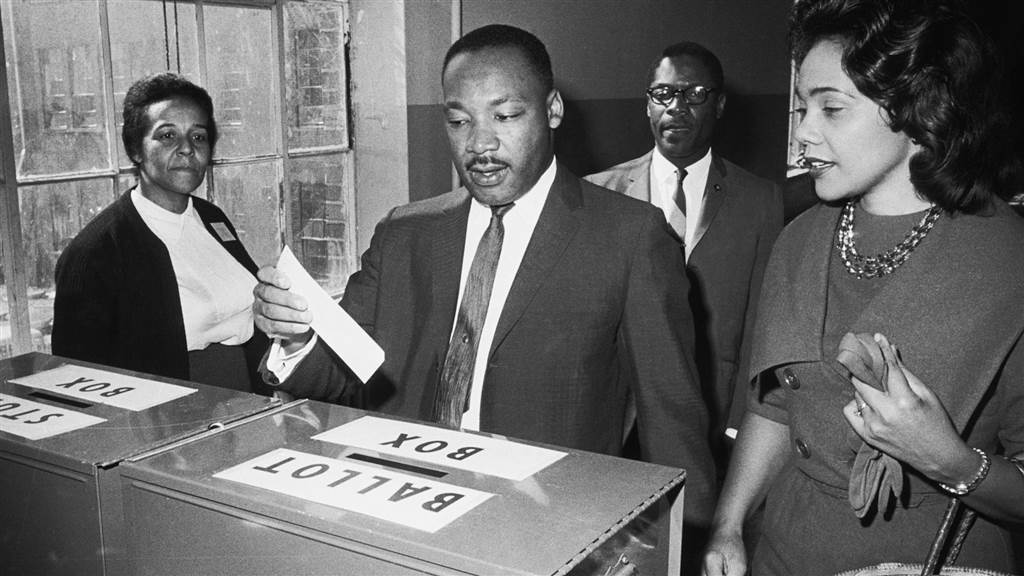
By Blake Douglas, news managing editor
When newly-named OUPD Chief Nate Tarver graduated from OU with a broadcast journalism degree in the 1970s, his job prospects were bleak. Weeks without callbacks or interviews from Oklahoma City media outlets slowly led him to realize if he wanted to advance his career, a change was needed.
“I actually ended up getting some interest from employers in Arkansas and in Nevada,” Tarver recalled. “(But) the lady I was married to, my wife at the time, she said, ‘Well, I’m not interested in moving.’”
The change Tarver knew would come didn’t involve him trading Oklahoma’s wind-swept plains for the Ozark foothills or Mojave heat. It came inconspicuously printed on a faded flyer posted at the Moore City Hall as he walked to pay his water bill one day: “Hiring police officers.”
“I’d never thought about being a police officer, and really hadn’t had any real interaction with police officers,” Tarver said. “I had a distant relative who actually was the first Black officer in Norman, his name was Booker Shackelford, I think he was actually a relative to my ex-wife.”
Tarver would follow a strikingly similar path, becoming the first Black police officer Moore hired. After 41 years of law enforcement experience and several postings in central Oklahoma, Tarver said he retired from the Oklahoma City Police Department after 26 years to accept a position as the deputy chief of OU’s Health Sciences Center.
After just over a year in the position, Tarver said, the HSC’s former chief vacated the position and he was promoted. The creation of Tarver’s new position as OUPD chief of all campuses and associate vice president is part of a “homogenization” of university operations, Tarver said.
“The reason they decided on one chief is because the whole university has been moving towards a unified structure, being under one university as we should have been the whole time, in my opinion,” Tarver said. “You know, obviously each campus started up for various reasons and had a method for why they were started up the way they are, but you know, for the cost benefit, unity … for buying power, if nothing else, and better pricing, it makes sense to be all under one big umbrella.”
While there will be challenges ahead, Tarver said, his first goal will be facilitating the centralization of all three OU campus police departments.
“There’s other things that need to be homogenized first, such as policies, you know, routes of buying vehicles, getting on the same type of radio system,” Tarver said. “There’s just a plethora of things that we need to merge — and there’ll be hiccups along the way, so we’ll have to overcome those.”
As Tarver takes on the new role, however, police brutality has once again violently vaulted to the forefront of public discourse. Black officers like Tarver are again faced with reconciling their career path with the color of their skin, when many citizens feel police departments continue to disproportionately target and brutalize minority communities.
‘They were surprised to see a Black face’
Though Tarver said he’d had few interactions with police growing up “very poorly” in a Tulsa family of 10 children, he was well aware of one reality in the American South during the time — Black people were not law enforcement officers. When he started as the first Black officer in Moore, he was reminded of that regularly.
“When I was in the police car for years, I got the police called on me several times because they thought I’d actually stolen the car,” Tarver said. “When I went to someone’s house, they would call the police station thinking that I was impersonating a police officer.”
Among Black communities, Tarver said his reception was also far from warm.
“Black officers have — I’m not going to say a more difficult time — but they have a difficult time because they get it from both sides,” Tarver said. “I’ve been called traitor, I’ve been called all those names.”
According to an article from Reuters and 2016 statistics from the U.S. Bureau of Justice, Black officers make up 11.4 percent of police forces nationwide, with Black citizens accounting for roughly 13 percent of the national population.
Despite the difficulties that accompanied being a Black officer, Tarver said he remained involved with the career due to the simple fact that he’d always striven to “do the right thing.”
In the decades since Tarver started his career, incidents of police brutality have continued to rock the U.S. These recurring incidents mean little has changed for Black officers since Tarver entered law enforcement in the 1970s.
“I like to say — and what’s commonly said in the vernacular of Black officers in this country — is that we’re too Black to be blue and too blue to be Black,” said Norman Police Deputy Chief Ricky Jackson, who first met Tarver through organizations for Black officers. “As Blacks coming into law enforcement, there’s a certain perception that they have of us so we have to carry ourselves a little different … coming home on the Black side, they look at us in uniform, and they assume a certain way.”
Tarver said despite the ongoing protests in the wake of high-profile police killings like Breonna Taylor and George Floyd, this summer’s unrest has not been the worst instance of unrest following police brutality.
“In my professional time, that would have to be the Rodney King incident in Los Angeles,” Tarver said. “As with many things in society, there’s a pendulum swing of how things go. I think that law enforcement, and law and order, is still at the forefront of a lot of people’s minds, and they are very concerned with it.”
‘Were we the best people to handle that?’
Tarver said he is acutely aware of the issues plaguing law enforcement to this day, however. At an OUPD community panel after his appointment as chief, he noted law enforcement as a whole is “going through some dark times.”
“We’ve had some people or some officers who were somewhat resistant to (diversity and inclusion) training, and it’s because I think the last term I heard (them describe it as) was ‘white-male bashing,’” Tarver said at the panel. “I think (the training) broke it down to a level that people can say, ‘Oh, I need to think a little bit differently about some of those things,’ so it was good training, and it’s also training that we will continue to do.”
Tarver acknowledged the need for police to be more transparent and communicative with the communities they serve.
“There’s a lot of misunderstanding, I think, and that’s some of our officers’ faults, for not taking time to sit down and explain things better to citizens and how things are done,” Tarver said. “But as far as people that think that the police have too much power or have pushed too far, we need to listen to them and find out exactly where that disconnect is.”
In Norman, a proposed increase to the police department’s budget was reduced and the funds set aside to be redistributed to other community resources, with one area of focus being mental health services. Some high-profile police shootings in the U.S. have also involved victims having a mental health or drug-related crisis.
Tarver said while he agrees armed police officers are likely not the best responders to these situations, government cuts to social services and mental health resources have made alternatives scarce and difficult to explore for many communities.
“If you will recount government spending, they have cut money to mental health, social work, things of those natures, and it’s been a trend over years,” Tarver said. “That’s how we ended up with a lot more responsibility on those things than we probably should have had in the first place, in my opinion, and initially, we were not given any training on how to deal with it.”
However, Tarver said the uncertainty of many situations involving mental health crises gives him reason to hesitate on whether sending only a social worker is the best option.
“If you have someone who has expertise in mental health or social work, and that’s their main function, obviously that’s a better person for it,” Tarver said. “There’s actually been some accounts in the country where they have sent unarmed social workers or mental health professionals on these calls, and they’ve gotten hurt because that’s what they thought it was to begin with, (but) the truth of the matter is it probably should have been a police officer. Maybe some hybrid might work where they respond with police, depending on what it is.”
As the national discussion around law enforcement has shifted to see communities considering reducing funding for their police departments to allocate to other areas — or, in Norman’s case, decreasing the amount of an overall increase — Tarver said he doesn’t necessarily see the decisions as ways to “punish” police departments.
“The whole defunding the police (discussion), in my mind what they mean is to allocate resources into other areas that would better serve society in the public than to send a police officer out there,” Tarver said. “I’m certainly not telling people how to do it, because those city and government leaders have to decide based on their obligation to their constituents how things need to be done, and that’s for them to decide, not for me.”
‘Gentleman Nate’
Tarver’s colleagues said they have no doubts that despite the tumultuous climate around law enforcement nationally, he is the best fit for OU to see greater understanding between OUPD and its community.
“What I’ve found out about my first impression is that it’s still my current impression — the first impression I had of (Tarver) was what a humble person he was,” Jackson said. “Over the years I have developed, again, that kind of an image of (Tarver) — and my nickname for him is ‘Gentleman Nate,’ because he’s always the consummate gentleman.”
Jackson said his perception of Tarver has been reinforced by Tarver’s kindness and selflessness in treating his friends like family.
“When my second child got married, Nate drove all the way to Durant. He was on some vacation somewhere, but he cut it short, he made a special trip to Durant to be there at my son’s wedding,” Jackson said. “That’s Nate Tarver — what you see is what you get. He is a very real and genuine person, and I count him as one of my best friends … and in law enforcement, we don’t count friends very easily.”
Oklahoma City Police Chief Wade Gourley — who attended police academy alongside Tarver when Tarver first transferred to Oklahoma City — said Tarver’s empathy makes him especially well-suited to lead a police department in the current social climate.
“Sometimes you hear the saying that people act one way when they’re at work, and one way when they’re at home and that’s really not the case with him. I’ve known Nate a long time, and he’s the same person of character, no matter what he’s doing,” Gourley said. “When you see protests and you (talk to) anybody in the crowd, they’ll talk about their frustrations and how they want to be heard. It’s so important to have someone that’s willing to sit down with all sides and listen.”
Despite pressure from some of his peers in the police force during his career, Tarver said he has never regretted doing what his conscience felt was the right thing — even if it meant scorn from other officers.
“I was involved with a situation with the Oklahoma City Police Department where there was a police officer that was breaking the law — he was actually taking drugs off drug dealers and either using or selling (them) for (himself). We did a sting operation on him, and ended up arresting him,” Tarver said. “I was one of the lead agents on it. And I ended up having to testify against him in court.”
Tarver was ridiculed by some other officers for his role in the arrest, he said.
“At the time, some of the Black officers thought, ‘You should have given them a pass, you should have warned him that they were coming after him.’ What, was I supposed to tell him that what he was doing was against the law? He should have known that,” Tarver said. “With that, I bore the brunt. There was about a year where other Black officers shunned me, they wouldn’t talk to me.”
Beyond race, Tarver said, he feels many incidents involving police brutality are motivated by the power dynamic between officers and residents of the community.
“It has to do with empowerment and respect is what I think,” Tarver said. “I think it has to do with how you look at someone and don’t see them on the same level as you see yourself … sometimes people aren’t just bad people. Sometimes people aren’t necessarily criminals, per se, but they are victims of their circumstances in life.”
Tarver said he tries to lead his officers by example in this regard and recalled his interactions with Johnny Lee Clary — a Ku Klux Klan leader who later became an anti-racism pastor — during his time as a police officer in Moore.
“(Clary) was a Klansman, and we knew what his philosophy was — but at the end of the day, when he changed his opinion, he told me, ‘You know Nate, it was interesting,’” Tarver said. “‘You treated me with respect, you always treated me well but you knew how I felt about you as a Black man. You treated me better than the white officers did.’ I didn’t think that I was lesser than he was, but I didn’t treat him like he was lesser than me.”
Though race and policing will continue to be one of the foremost topics discussed in incidents of police brutality, Tarver said he has never felt his race makes his job any different than what it is for others.
“When I go into this job, I don’t go into it looking at it as though I’m a Black guy trying to succeed. I look at it as I’m a man, and I’m trying to do the best job I can,” Tarver said.










